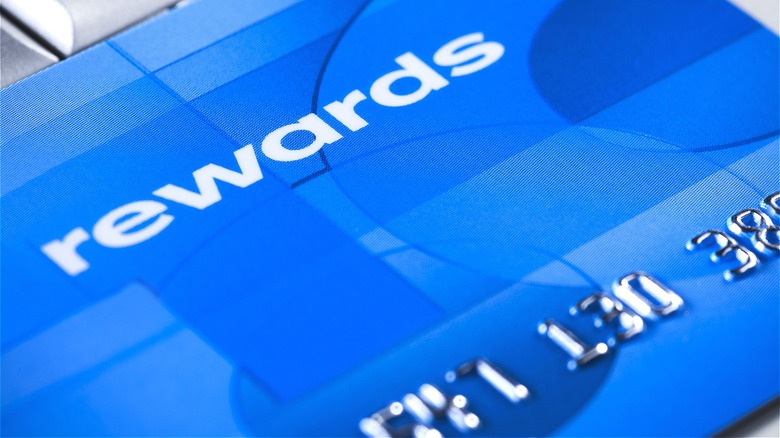The Dark Truth Behind Credit Card Rewards
According to the Consumer Financial Protection Bureau, 90% of all credit card spending is made with cards that offer rewards to their users. That's only smart because such rewards typically consist of cash back, airline miles that can be used for free flights, hotel points toward free nights, and more — all for buying a product or service you were going to purchase anyway. However, funding these rewards can amount to hundreds, or even thousands, of dollars per consumer every year. So how exactly do credit card providers pay for them?
CNBC reports that in 2019, credit card issuers doled out over $35 billion worth of rewards. Yes, that's $35 billion with a "b." That might seem generous to a fault until you consider that during that same year, fees were collected in the amount of $9.9 billion, while income from interest paid on balances totaled $89.7 billion. Finally, $41.3 billion was earned from swipe fees, or processing fees that merchants pay to the credit card companies and issuing banks. Added all up, that's more than $140 billion in profit against the expense of $35 billion in rewards. A lucrative endeavor indeed.
While there's nothing wrong with capitalism, some consumer advocates criticize that credit card rewards for wealthy Americans are subsidized by the poor and those with bad credit. Fortunately, there's no barrier to learning how to responsibly take advantage of these rewards while avoiding unhealthy debt, regardless of income level.
Card issuers want you to carry a balance
While getting something for nothing — which certainly is possible with credit card rewards — is a great concept, some consumers find themselves overspending in a quest to accumulate points. Don't get caught up in the gamification of credit card awards and don't make unnecessary purchases just to rack up points or earn a bonus. Similarly, avoid charging more to your credit cards than you can afford to pay in full every month.
The interest rates that banks charge for carrying credit card balances are among the highest of any type of loan, averaging approximately 24% in January 2024. You're better off taking out almost any other type of loan to pay off credit card debt rather than leaving a balance on cards, which can take years to pay off.
While the best policy is to pay in full your card balance each month and avoid accumulating credit card debt altogether, that advice may be too late in arriving for some who already have balances. In that case, check if you're eligible to open a new credit card with the ability to transfer balances over at a low (or zero) promotional interest rate, typically good for a timeframe of six to 18 months. By paying less interest, you'll get the balances paid off more quickly.
Merchants pay pricey swipe fees
You might not even realize it, but every time you use your credit card to pay for gasoline, groceries, or online purchases, the seller has to pay a small commission to the card-issuing bank and credit card company (like Visa, Mastercard, American Express) for facilitating the transaction. In the industry, these processing fees are known as swipe fees.
Swipe fees for debit cards are typically pretty modest — about 1% of the transaction value — but credit cards can easily rack up swipe fees of 2%, 3%, or even more. The banks and card issuers on the receiving end of these fees claim that the amount offsets handling costs, fraud, and non-payment from customers. However, many merchants are resentful of swipe fees, particularly as paying with cash becomes increasingly obsolete. Merchants cite lack of competition as an issue, and point out that costs should fall as technology improves, yet fees have remained the same for decades.
Occasionally, it may be possible for consumers to save some money by paying via cash, check, or electronic transfer. For example, it seems that many city and county taxing authorities like driver's license bureaus are willing to offer a discount for cash or check — or at least waive a "convenience fee" surcharge for using credit cards. Of course, that means losing out on accumulating miles or points from a reward credit card, but consider if earning those perks is worth paying a 3% more.
You might have to pay an annual fee
Paying an annual fee for the convenience of using a credit card was once commonplace to boost profits for card issuers, but nowadays, there are plenty of credit cards that don't charge any annual fee whatsoever. Those that do typically fall into two categories: premium travel rewards credit cards and cards that cater to individuals with bad credit. In the theme of this article, we'll focus on the former.
Exactly how much do typical annual fees cost? It can be anywhere from about $50 up to $600 or more for ultra-premium cards like American Express' Platinum card. Besides the ability to rack up points or airline miles through everyday spending, certain travel cards also come with other more specific perks, such as hotel-branded credit cards that offer one free night stay each year or airline cards that provide free checked luggage. Benefits like those, assuming you're utilizing them, can make it easy to justify paying an annual fee.
For cash-back reward cards with an annual fee, consider whether you'll earn enough cash back to justify the fee. For example, a credit card that provides 3% cash back might seem like a great deal, but if the annual fee is $100, that means you will need to spend at least ~$3,300 on the card just to break even. At the same time, alternatives paying 1% or 2% cash back might have no annual fee.
Welcome bonuses can encourage overspending
The holy grail for savvy credit card users is the generous welcome bonus (aka sign-up bonus) that's available to new cardholders for charging a certain amount of purchases to the card within a defined time period. For example, at the time of this writing, the Sapphire Preferred card from Chase offers new cardholders 60,000 bonus points for charging $4,000 worth of qualifying purchases to the card within 90 days of opening the account.
Even though the card has an annual fee of $95 that you'll have to pay, those 60,000 points are worth $750 when spent through Chase's own travel portal and can be worth $1,000 or more by strategically transferring them to travel partners, such as airlines. Yet, some consumers might have a difficult time organically spending $4,000 in just three months' time, which can lead to an unnecessary, frivolous spending spree just to meet the bonus requirements. Then, if cardholders are unable to pay the credit card bill in full each month, card issuers will be more than happy to collect sky-high interest on the balance, which more than compensates them for the bonus offer.
Don't misunderstand; sign-up bonuses are tremendously valuable, provided that you're disciplined. Consider opening new credit cards with welcome bonuses coinciding with major purchases like new appliances, a vacation, or new car. Alternatively, creative types may be able to pay rent or mortgage using a credit card. Though a small fee may be involved, it can be worth paying to earn a big bonus without reckless spending.
Be smart about credit card rewards
To recap, the truth is that credit card issuers make money in spite of offering rewards. Their revenue streams include charging merchants swipe fees and collecting annual fees from cardholders, as well as charging interest on balances (and late fees for missed payments). As far as swipe fees, there isn't too much the average consumer can do except to accept a discount for paying cash or by check when offered. On the other hand, merchants — especially small businesses — can feel a negative financial strain from these fees, which haven't changed in decades despite improvements in technology.
This said, you do have the choice on whether to continue paying annual fees based on the realistic benefits received from the card. If you don't want to close a credit card altogether, which can impact your credit score negatively in the short term, inquire whether the card issuer has a fee-free version of the card instead — albeit with fewer perks — because many do.
Also, try to never carry a balance on your credit cards, which is subject to interest rates that would make the mafia blush. Before applying for a new card with a sign-up bonus, consider whether you'll realistically be able to meet the spending requirements without overextending your budget. If not, consider delaying your application until a large spending opportunity presents itself naturally.





